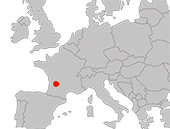Last articles
Download the PDF >![]() < Preview the PDF
< Preview the PDF
When it comes to invasive species in beekeeping (not including Varroa mite which invaded Europe a long time ago), we think about small hive beetle, the yellow leg Asian hornet and the tropilelaelaps mite.
Hedgerows in mid-February might have traditionally appeared white with snow; this year the white was the work of blackthorn blossoms – a harbinger of spring.
World Bee Day is observed on 20 May each year to draw attention to the essential role bees and other pollinators play in keeping people and the planet healthy.
Sustainable agriculture requires balancing crop yields with the effects of pesticides on non-target organisms, such as bees and other crop pollinators.
The increasing loss of pollinators over the last decades has become more and more evident. Intensive use of plant protection products is one key factor contributing to this decline.
Honey bees are crucial for our ecosystems as pollinators, but the intensive use of plant protection products (PPPs) in agriculture poses a risk for them.
A fresh, modern approach with enhanced traceability and more comprehensive tools for detecting adulteration.
Lithium has been considered a potential acaricidal agent against the honey bee (Apis mellifera)
parasite Varroa.
A path for rational discoveries in apitherapy. Scientific based evidence supporting the nutritional, physiological and health claims of bee products.
Propolis via antiviral, anti-inflammatory, antioxidant, and antithrombotic activities could be used as prophylactic or adjuvant COVID-19 treatment.
Ongoing environmental changes are however leading to pollinator declines that may cause pollen limitation to plants and change the evolutionary pressures shaping plant mating systems.
Diabetes mellitus remains a burden worldwide in spite of the availability of numerous anti-diabetic drugs. Honey is a natural substance produced by bees from nectar.
Ukraine’s Ministry of Foreign Affairs announced the “Minefields Honey” project to draw global attention to the issue of de-mining and Ukraine’s new agricultural reality
Contrary to the will of citizens and the need to protect bees, European lawmakers are slowly disarming the flagship legislation aiming to reduce pesticides.






























